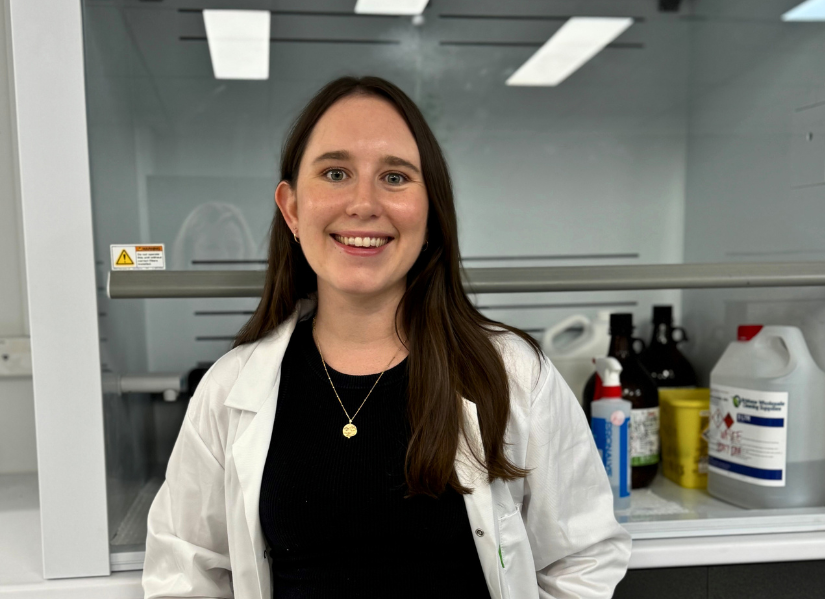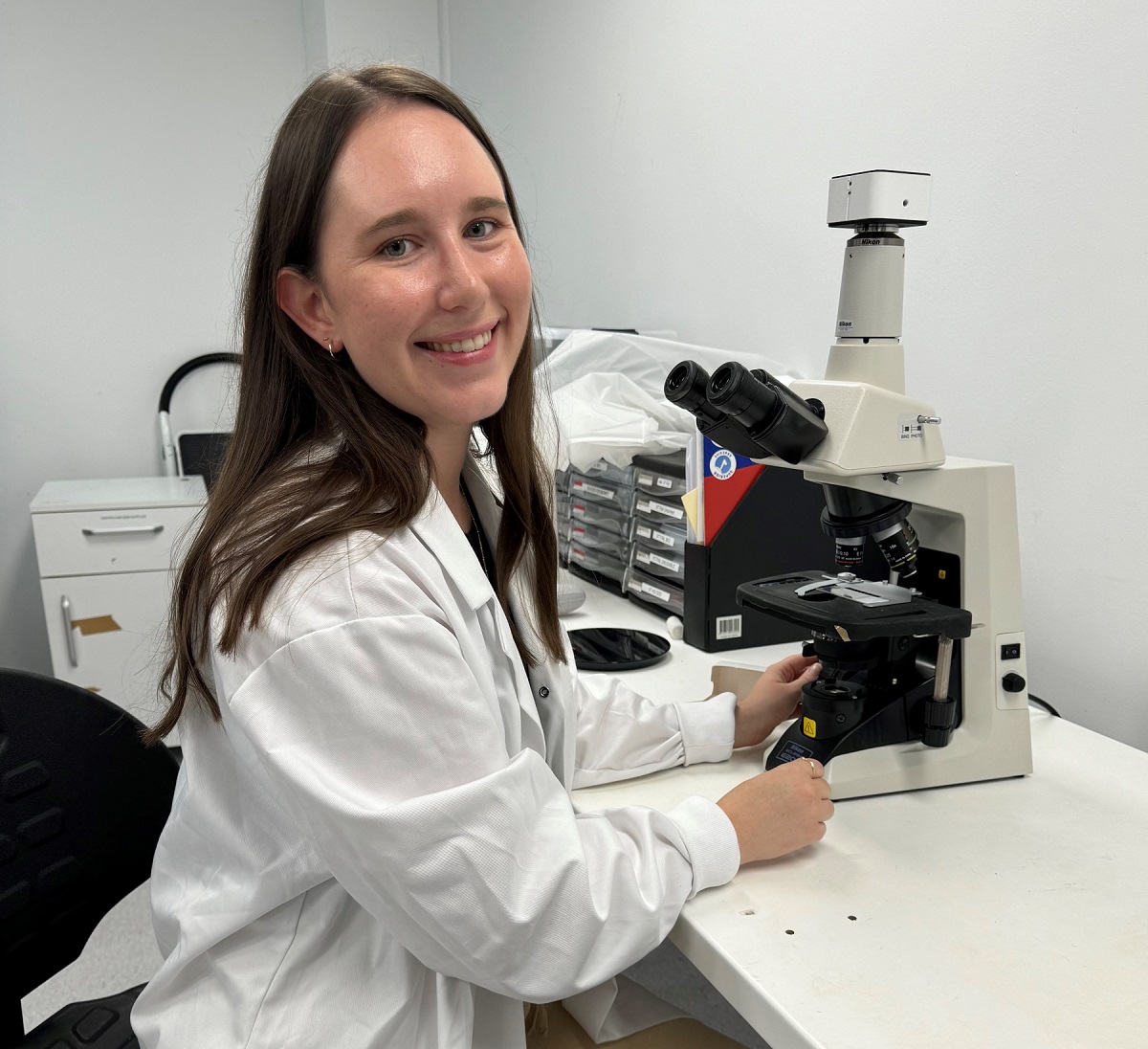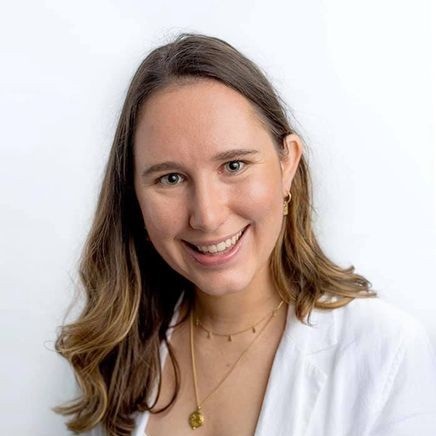
Charlotte McCullough, 6 March, 2024 | Chloe Turrell, QUT Alumnus, Bachelor of Engineering
Join us for an insightful conversation with QUT alumnus, Chloe Turrell - an award-winning Senior Biomedical Engineer who is working on groundbreaking solutions to current healthcare issues. Chloe shared more about what ignited her passion, who inspires her, and how her QUT Degree in Medical Engineering played a key role in shaping her trajectory. She also discussed her successful leadership principles and non-negotiable skills that have undoubtedly contributed to her recent award as Queensland’s Emerging Professional Engineer of the Year. Chloe works for WearOptimo and speaks from the frontier of healthcare innovation, unveiling some cutting-edge projects taking shape in the wearable technologies space.
What inspired you to pursue a career in biomedical engineering, and how did your studies at QUT contribute to shaping your professional journey?
I always wanted to work within the health sector but I also had a keen interest in maths and science. I stumbled upon a video in my final year of high school of deep brain stimulation being performed on a patient during open brain surgery and discovered biomedical engineering. From that moment on, I knew that was what I wanted to do – combining my two passions by working on engineering solutions to help the most complex machine of all – the human body. QUT offered the right course to give me the technical ability to pursue my dream as well as an empowering community and many opportunities for personal and professional development. This spanned from academics who were invested in their students’ education, to student clubs for peer support and professional development, overseas study and internship opportunities, and local industry and research connections.
Congratulations on being awarded Engineers Australia's QLD Emerging Professional Engineer of the Year in 2023. This award recognises excellence and leadership – what leadership principles and practices do you find are the most successful?
Thank you! There are so many principles and practices that build great leadership skills. Areas I think are critical are emotional intelligence, vision, action, and passion. Emotional intelligence – Having an understanding of your own motivators, biases and triggers is critical to self-regulation i.e. controlling your emotions and reactions. You can then use these skills to identify your team’s motivators and triggers and use this information to better influence and communicate with people. Vision and action – it’s important to be clear on your vision for your team to be able to unite and work towards a common goal cohesively. However, vision fails without action. Ensure you have a plan with clear and achievable goals. Communicate vision and action with unambiguous goals and direction. Passion – you want a leader who can empower people, who is passionate about their work and goals, and passionate about supporting their team.
Can you share any cutting-edge projects or innovations you've worked on that have transformed the healthcare landscape?
At WearOptimo, I am working with an exceptional team to bring forward a sensor device for monitoring hydration levels in harsh environments. Our device could hugely impact the safety and performance of elite athletes or people in the resources sectors. Our device differs from most sensors that sit on top of the skin in that our device’s micro-electrode penetrates into the top nerveless layers of the skin. This allows us to interrogate signals in the skin to high accuracy. As a senior biomedical engineer, I work towards designing micro-electrodes that can easily, robustly, and safely, be applied to the skin. I work closely with other engineering disciplines to ensure requirements from all our teams are satisfied.
 What skill couldn’t you live without?
What skill couldn’t you live without?
I couldn’t live without the ability to problem solve. Problem solving is such a broad term, but to me it starts with understanding the purpose, breaking down a project into clear requirements, and then finding creative solutions. These may be complex or very simple – remember over-engineering does exist. This may require you to think outside the box especially if you are working with limited resources. It requires planning, prototyping and experimentation, learning from initial designs, and re-iteration. Problem solving brings me a lot of joy, I love the satisfaction of overcoming a really large problem with a unique solution I am proud of.
What’s the best piece of advice you have ever received?
One piece of advice I once received and like to pass on to students and early career engineers, is: if you want to learn more about a topic or career path, find an expert in that area and invite them out for a coffee. The worst they can do is say is no or not reply. If you show a genuine interest in their work, people generally love sharing their experiences (and love a free coffee). Finding experts can be as simple as attending networking events, asking a professor for a recommendation, or searching on LinkedIn. It is something I still practice today.
What would you tell aspiring young female engineers?
Start building your network. Having people you trust to go to for advice is hugely helpful. I am still good friends with a group of engineers I studied with at QUT and have also since found a great group of female engineers a few years further into their careers than me who I catch up with every few months. Back yourself! Speak up in meetings, ask questions, apply for that job you don’t meet all the criteria for. Unfortunately, a disproportionate amount of us women have felt imposter syndrome before (56% of females compared to just 34% of males in engineering careers). Trust your abilities and know that you worked hard to get where you are, but also recognise that it is okay to ask for help and admit when you’re wrong.
Who are the female changemakers that inspire you?
I’ve been fortunate enough to meet so many incredible women who I look up to. I am inspired by women who are avid creative problem solvers, good communicators, pioneers in innovation, assertive and kind, and actively give back to mentor and empower others.
I worked under Caroline Boudoux’s supervision during an internship abroad; as well as being an esteemed researcher and professor at Polytechnique Montréal, she co-founded a successful optics company, has published textbooks used in undergraduate classes, and is a fantastic mentor and enthusiastic teacher.
Lusia Guthrie is another incredible woman in STEM whose passion for innovation, leadership, and entrepreneurship is contagious. She has had a 40-year career in the pharmaceutical and bioscience industries and is a MedTech entrepreneur, company founder, experienced CEO, mentor, board chair and non-executive director. I’m so grateful for her mentorship and advice in my career.
I met Ashley McCarthy-Griffiths at QUT while we were both studying and joined the 'Girls in Engineering Making Statements' student society. Ashley’s friendship and mentorship inspired me to keep pushing myself to take on new opportunities both during university and in my engineering career. I now work with Ashley in a volunteer not-for profit, 'The Power of Engineering,' educating students about and breaking down stereotypes in engineering.

Looking ahead, what do you see as the most exciting opportunities in the field of biomedical engineering?
As technology advances, so do the possibilities to transform and improve healthcare, but with the privilege to work in this industry comes a lot of responsibility. The regulation and documentation process is crucial for commercialising a safe healthcare device and learning opportunities in this space are increasing. The wearable technology market is growing at a rapid pace as many companies and labs around the world work on various wearable sensors for a myriad of applications. A lot of our work at WearOptimo would not have been possible with the supporting technology that was available just five years ago, and I feel grateful to be connected to many medical experts who I can continue to learn from so that we can change people's lives through innovation.
Chloe Turrell
QUT degree - Bachelor of Engineering (Honours) (Medical) (2019)
Do you have a question for Chloe? Connect with her on LinkedIn.
